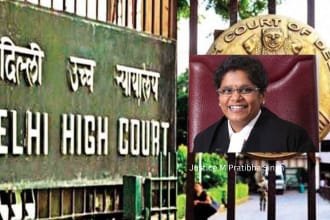In a recent hearing that highlighted the Supreme Court’s emphasis on judicial efficiency and fairness, the Bench comprising Justice Abhay S. Oka and Justice Ujjal Bhuyan expressed serious displeasure at Additional Solicitor General (ASG) Archana Pathak Dave for raising a technical objection midway during arguments in a remission case. The matter was heard on April 22, 2025, and involved a convict seeking release after serving twenty years of a life sentence.
The incident underscores the judiciary’s growing concern about delays in court proceedings and the necessity for counsel to present objections and contentions timely. The Supreme Court’s sharp remarks not only directed attention to courtroom decorum but also reflected its commitment to addressing cases promptly, respecting the time and rights of all litigants.
Background of the Case
The case involved the question of whether a convict, having completed twenty years of imprisonment, was entitled to remission and release. The Bench had earlier, through two detailed orders in February and March 2025, flagged that it would examine the interpretation of the High Court’s judgment awarding life imprisonment to the petitioner.
The Supreme Court had made its intent clear to all counsel involved — that the interpretation of the operative part of the High Court’s judgment would be a central issue. Accordingly, the Court scheduled the matter for priority hearing on April 22, 2025, even going so far as to discharge all other matters listed for the afternoon session to focus exclusively on this case.
ASG’s Late Objection and the Court’s Reaction
Despite the clear directions issued earlier, ASG Pathak raised a preliminary objection half an hour into the hearing, arguing that the petitioner had not specifically pleaded the ground regarding entitlement to release after twenty years of imprisonment. Consequently, she contended that the Court should refrain from addressing that issue.
This raised the ire of the Bench. Justice Oka firmly stated:
“What is this? Because of this matter, we asked other litigants to go because we are hearing it. And now you are raising a technical point which you ought to have raised at the beginning. People are in queue and you are wasting court’s time. This is not done. I will record all this in order.”
The Court emphasized that raising such an objection midway through the proceedings — especially when prior orders had already outlined the issue — was “unfair to the other litigants” and amounted to a waste of judicial time.
Justice Oka also orally observed that raising contentions at a late stage often served to delay hearings unnecessarily:
“Every day we are experiencing this. Why such contentions are being raised (when) we know that there is a time limit. Therefore, all contentions are raised so that matter is postponed. It is not only unfair to us; it is unfair to so many litigants.”
Apology by ASG and the Court’s Response
Realizing the Court’s strong disapproval, ASG Dave immediately apologized, taking full responsibility:
“We are so sorry milords… It is my mistake, I take it up on me…I give away with that objection, I can continue with the arguments.”
Justice Oka, however, emphasized that the Court’s concern extended beyond this particular case, reflecting broader systemic issues regarding case management and the need to respect litigants’ time. He remarked:
“Frankly speaking we are trying to take as many matters as possible. We feel very bad … People were waiting here. At 3:15 we told them to go away … If ultimately members of the bar feel that we should not work more, I am not prepared to exercise that option. Whatever may be the criticism, I am ready to accept it.”
Ultimately, despite the ASG withdrawing the objection, the Court decided to adjourn the matter and permitted the petitioner to amend the petition to formally include the ground concerning the twenty-year rule — although the Court clarified that such an amendment was strictly unnecessary in light of its previous orders.
The matter is now scheduled to be heard on May 7, 2025.
Key Takeaways from the Hearing
- Strict Adherence to Court Orders: The Supreme Court expects strict compliance with earlier orders, especially when issues have been clearly flagged in advance.
- Timeliness in Raising Objections: Counsel must raise preliminary objections at the earliest opportunity. Bringing up technicalities midway wastes judicial time and is unfair to other litigants.
- Judicial Efficiency Matters: The Court showed its resolve to manage its docket effectively and avoid unnecessary delays. Prioritizing urgent matters and discharging other listed cases should not be taken lightly.
- Responsibility of Counsel: Lawyers, especially those representing the government, are expected to assist the Court responsibly, ensuring the smooth and efficient administration of justice.
- Balancing Fairness to All Parties: Courts must balance fairness not just to parties in a particular case, but also to other litigants waiting for their cases to be heard.
Conclusion
The Supreme Court’s strong reaction to the events of April 22, 2025, sends a clear message to the legal community about professionalism and timely conduct in court proceedings. As the judiciary grapples with an ever-increasing caseload, ensuring discipline in litigation practices becomes even more critical.
This case also highlights the importance of the Bar and the Bench working together to maintain the dignity of the courtroom and uphold the principle that justice delayed is justice denied — not just for a few, but for every litigant waiting for their turn in the system.
The remission hearing in question, now slated for May 7, promises to revisit these significant questions surrounding the interpretation of life imprisonment sentences and the scope of remission under Indian law.


